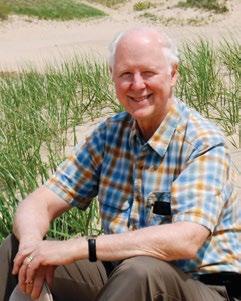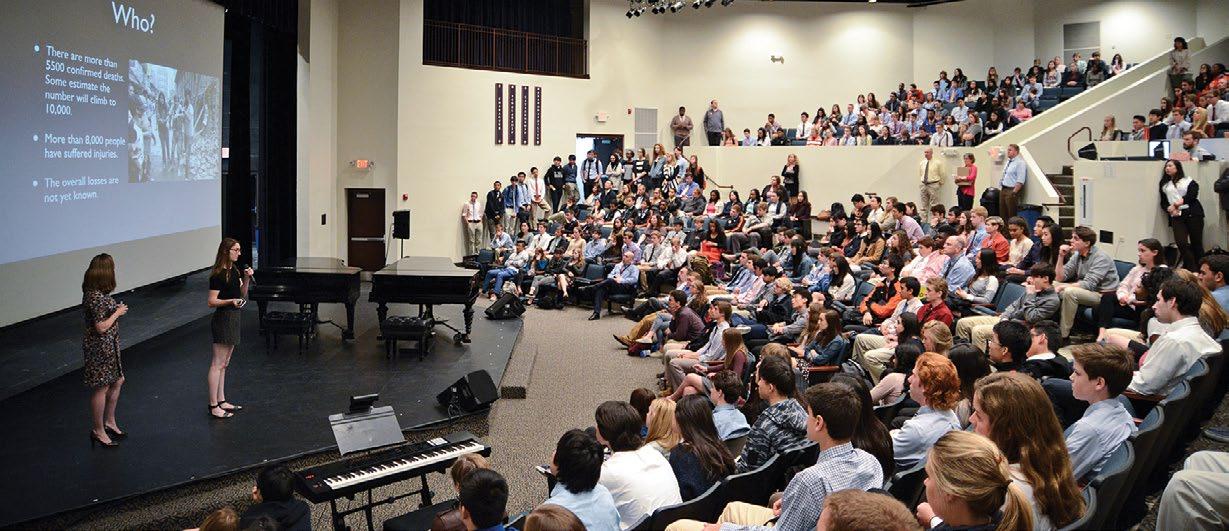
5 minute read
Features
LFA Alumni Experts Weigh In on COVID-19
By Barry Reszel, Stewardship Coordinator & Advancement Writer
Advertisement
As the world looks to epidemiologists and other health care professionals to help governments, educational institutions, organizations and individuals design their new normal, veteran medical experts in the Lake Forest Academy community shared keen insight into the COVID-19 pandemic and its effects on society and LFA.
Dr. Randall Holmes ’58 studied infectious diseases and performed research funded by the National Institutes of Health (NIH) during his illustrious career. His journey began with an undergraduate degree in biomedical sciences from Harvard University, an M.D. and Ph.D. from New York University and service as educator, researcher and administrator.
“My basic research is understanding how diseases work,” he said. This forms the infrastructure for developing drugs and vaccines that will help the treatment and prevention of infectious diseases,” said Holmes, a professor emeritus at the University of Colorado School of Medicine’s Department of Immunology and Microbiology.
Dr. Randall Holmes ’58 It’s not surprising, then, that while focused on the science, Holmes offers a dose of pragmatic guidance to all simultaneously dealing with both public health and economic crises. “My strongest advice to individuals, institutions and state and national leaders is for them to work together collaboratively and to include the rapidly growing and evolving body of scientific knowledge about the novel coronavirus that causes COVID-19 as an essential resource in the development of informed, rational and effective policies and procedures at local, regional, state, national and international levels,” he said.
Indeed, Holmes doesn’t have far to travel for inspired intellectual discussion on the world’s current hottest topic. That’s dinner-table talk with his wife, Dr. Kathryn Voelker Holmes, professor emerita at the University of Colorado School of Medicine’s Department of Immunology and Microbiology. Kathryn Holmes is an expert on coronaviruses, having published more than 150 articles and book chapters on the subject. She has also researched, written, lectured and reviewed at numerous academic institutions and organizations, including the National Institutes of Health (NIH). Her academic pedigree includes Radcliffe College (AB degree in biology), Rockefeller University (Ph.D. in virology and cell biology) and Harvard University (postdoctoral, cell biology).
Like her husband, she has overarching observations and specific thoughts about “the biggest hurdle for the world”— deciding how to deal with COVID-19. “There cannot be one common decision for the entire world because of the tremendous disparities of wealth, sanitary conditions and population density, among others,” she said. Kathryn Holmes implores leaders to follow the knowledge of experts, not hunches. “Public health people know what is needed to mount massive and continuing programs to test people for both evidence of active coronavirus infection and for antibodies,” she said. Politics, she said, are responsible for “tragic surprises” among groups that have caused needless deaths. “Sadly, this will continue to happen until the testing program is designed, coordinated and implemented nationally by public health experts.”
Dr. Mary Hediger ’68

Dr. Mary Hediger ’68, who lives in the Philadelphia area, says LFA is fortunate to be “in a state where the Governor took early and rather strong mitigation efforts to control the spread of the pandemic.” Ferry Hall alumna Hediger holds a Ph.D. in biological anthropology from the University of Pennsylvania and spent her career championing research in vulnerable populations. Her principal work was with the Eunice Kennedy Shriver National Institute of Child Health and Human Development. She also served the National Research Council, the World Health
Organization and the Centers for Disease Control and Prevention, among others.
Hediger said she thinks schools will be challenged to adopt “creative scheduling” when reestablishing in-person instruction. “In English class you can put the students in a fairly large room and at a far distance. But labs could be a problem, depending on how you stagger them to limit the number of kids allowed to be in there,” she said. Fall in-class instruction is potentially achievable for schools, Hediger said, “unless it looks like we’re in for a really bad wave because there are states or areas that have opened too soon as opposed to keeping the mitigation measures.”
Kathryn Holmes is sober about the challenges institutions face, championing the importance of education and leadership. “For LFA and other schools,” she said, “learning must go on. Very good ways are emerging to accomplish that. I have enjoyed using Zoom to teach about coronaviruses in several high schools and to do long-distance lecturing to physicians and interested groups of adults.”
Broadly, schools may toggle between virtual and on-campus learning. Randall Holmes said institutions will deliver services based “on availability of adequate tests for active virus infection and for antibodies that reflect the presence of immunity…among students, faculty and staff—as well as resources for quarantining and treating them and their contacts if they are infected.”
He continued, “LFA is a small and private educational institution trying to navigate the rough waters in the stream of the current COVID-19 epidemic. I applaud
Dr. Kathryn Holmes
the efforts of the LFA administration to find constructive solutions to the current and admittedly major problems presented by this situation. Future decisions must be based on the data that represent the ongoing impact of the COVID-19 epidemic in your local community.”
On a personal level, the Holmeses have two daughters and a son-in-law who are physicians. “We know personally how awful it is for people to be told to do their jobs without basic PPE (personal protective equipment) to make them as safe as possible,” Kathryn Holmes said. Hediger also spoke emotionally about the sacrifices of health care workers. “I have to be emotional,” she said. “I still have a lot of friends who are working in major metropolitan hospitals.” She tells of a close friend in New York City whose pediatric intensive care was re-purposed for coronavirus patients and is now dealing with pediatric inflammatory disease cases.
“I’ve been doing my bit by not seeing my grandchildren and following along with everything that’s going on,” Hediger said. “But oh my goodness, they (health care professionals) go in there every day. It’s been extraordinary—their willingness to die for the rest of us—just amazing.”









